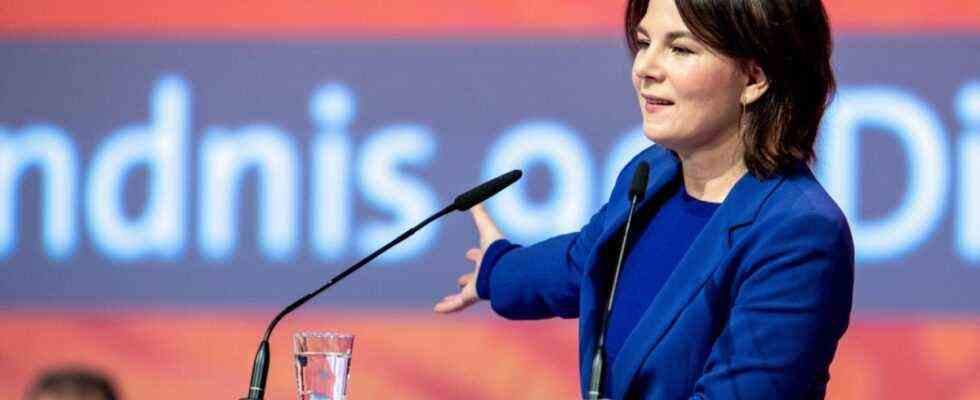First the congratulations. “A great election result,” said Olaf Scholz to Michael Vassiliadis, who had recently been confirmed by his people with 97.4 percent of the vote as chairman of the mining, chemical and energy union. “We are still in the coalition negotiations,” he adds, and by “we” he means the potential traffic light coalitionists who started the coalition negotiations in their 22 working groups on Wednesday. “The election will take place in December if everything goes as we planned,” he adds afterwards, and this time he means the election of Chancellor, i.e. himself, if everything goes as he has planned.
It is common for politicians to speak at trade union conventions. But on this Wednesday, after Scholz, Annalena Baerbock (Greens) and Christian Lindner (FDP) also appear, which means that the traffic light, which is currently being negotiated in Berlin, has a gig together. And because the vow of silence for the red-green-yellow negotiations has been kept so far, it is interesting what the three of them say when they have to say something.
In addition: Vassiliadis and the approximately 600,000 members of the industrial union are not a very easy audience for the traffic light people. Their exploratory paper demands major adjustments from most of them, some would say: unreasonable. Mining, chemicals and energy are the union’s territory, all sectors that will either fall by the wayside on the way to the desired climate neutrality, such as coal mining. Or who will have to re-model their processes, such as the big power producers and chemical companies.
With Scholz, however, such unreasonable expectations are transformed into future prospects, into a plan that no one should be afraid of. The necessary conversion? “That only works with the unions.” The rising cost of energy? One can cope. The workplaces? Germany could become “a leading country in the industrial world of the future”. It should go quickly, very quickly, promises Scholz. The new government will set the course “in the first year” so that Germany does not have an electricity shortage, so that Germany has enough electricity for an industry of the future “. The last nuclear power plant will go offline at the end of next year, so you have to accelerate particularly fast so that the industry gets the electricity it needs.
The Greens are seen here as a job threat
While for Scholz a trade union day, even with a traffic light exploratory paper in the leather bag, will always have the character of a home game, after all he is a social democrat, Annalena Baerbock has it a bit more difficult. The Greens are traditionally perceived in the Mining, Chemical and Energy Industrial Union (IG BCE) as a threat to their own jobs. On Wednesday, too, Vassiliadis made no secret of it when he greeted Baerbock. But it relies on reconciliation, not only wants to “fill in trenches”, but even “build bridges”, learn from one another, and preserve Germany’s prosperity and industrial location.
At Baerbock, the immediate climate program of a possible traffic light coalition comes as a great opportunity, as a promise of a seal of quality “made in a climate-neutral Europe”, a kind of European 2.0 version of “Made in Germany”. On the way there, the Greens chairman Olaf Scholz apparently even wants to overtake at an even faster pace. As early as January 1, 2022, the blockages in renewable energy would have to be resolved and, above all, wind power would have to be massively expanded.
The Greens are not leaving out the sensitive issue of the coal phase-out, which, according to the exploratory paper, should “ideally” be brought forward from 2038 to 2030. The explorers had agreed on this step at the instigation of the Greens and stated that a check should be made earlier than previously planned to see whether the quicker departure from coal could be achieved. It is, says Baerbock, “a warm invitation to take this courageous step together”.
Lindner’s tax cut plans are not well received either
A step of which Christian Lindner will say shortly afterwards: “That was not a concern of the FDP.” The old Christian Lindner would probably have made one or the other snappy remark at the expense of the Greens. The new Linder, however, the Ampel-Lindner, lets that remain of course and instead says: It is part of a coalition that one accepts the compromises that have been found together.
Incidentally, Lindner knows of course that he is viewed with at least as skepticism by the trade unionists as Baerbock. At the latest when he says no to tax increases, which will be the case at the end of his speech. Before doing this, however, he first speaks about the fact that the “ambitious goal” of an early phase-out of coal should not jeopardize security of supply and the competitiveness of energy prices any more than the directly and indirectly affected jobs. “If we do it right,” Lindner lures the industrial trade unionists, “a new opportunity” could arise from decarbonization, even “great export opportunities”.

